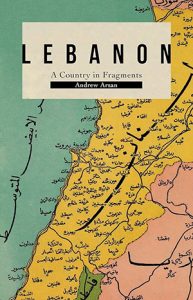Lebanon: A Country in Fragments

Author: Andrew Arsan
Publisher: Hurst Publishers
Year of Publication: 2020 (Paperback Edition)
Print Length: 520 pages
Genre: Non-Fiction / History, Political Science
Area: Lebanon
Topic: Culture & Society, Everyday Life, History, Fragility, Precarity, Refugee Urban Settlement, Refugees & Forced Migration, Asylum & Asylum Seekers, Migrants, Foreign/Migrant Workers, Camps, Conflict, Foreign Intervention, Geopolitics, Neoliberalism, State Formation, Politics & Power, Populism, Public Disillusion, Repression, Xenophobia
A reflective examination of everyday life in Lebanon in times of precarity and political torpor. Winner of the Philip Leverhulme Prize for History, 2018.
Lebanon seems a country in the grip of permanent crisis. In recent years it has suffered blow after blow, from Rafiq Hariri’s assassination in 2005 to the 2006 July War, to the arrival of a million refugees fleeing war in Syria, and nationwide protests in 2019.
This is an account not just of Lebanon’s high politics, with its endless rows, walk-outs, machinations and foreign alliances, but also of the politics of everyday life: all the stresses and strains the country’s inhabitants face, from electricity black-outs and uncollected rubbish to stagnating wages and property bubbles. Andrew Arsan moves between parliament and the public squares where protesters gather, between luxury high-rises and refugee camps, and between expensive nightclubs and seafront promenades, providing a comprehensive view of Lebanon in the twenty-first century.
Where others have treated Lebanon’s woes as exceptional, a by-product of its sectarianism and particular vulnerability to regional crises, Arsan argues that there is nothing particular about Lebanon’s predicament. Rather, it is a country of the age—one of neoliberal economics, populist fervour, forced displacement, rising xenophobia, and public disillusion. Lebanon, in short, offers us a lens through which to look on our times.
‘Lebanon seeks to understand, and explain, Lebanon on its own terms. Only by doing that can the story of this complicated country be fairly told … [this book] can serve as a manual for those in Lebanon wishing to understand their country better in order to change it.’ — Joey Ayoub, Al-Jumhuriya
Table of Contents
Acknowledgments
Introduction: Lebanon and the Twenty-First Century
PART I: THE TIME OF POLITICS
1. Intifadat Al-Istiqlal, or the Independence Uprising—The Moment That Passed
2. Al-Hawadith, or the Events—Lebanon’s Tumultuous Years
3. Al-Faragh, or the Vacuum—Lebanon Between Two Presidents
4. Al-Za’ama—On Political Leadership and Partisanship in Lebanon
PART II: THE TIME OF THE EVERYDAY
5. Al-Mishwar, or the Walk—On Space and Capital in Contemporary Lebanon
6. Al-Akharin, or the Others—On Lebanon’s Refugees and Migrant Workers
7. Al-Sahra, or the Night Out—On Leisure and Pleasure in Contemporary Lebanon
8. Tal’it Rihatkum, or ‘You Stink’—On Waste and the Lebanese Body Politic
Conclusion
Afterword
Notes
Bibliography
Index

Andrew Arsan is Lecturer in Modern Middle Eastern History at the University of Cambridge and a fellow of St John’s College, Cambridge. His particular interest in the Arab World’s cultural, political, and intellectual history; European imperialism in the Middle East and North Africa; and diaspora and the transregional movement of people. His first book, Interlopers of Empire: The Lebanese Diaspora in Colonial French West Africa was joint winner of the 2015 Royal Historical Society Gladstone Prize. He is one of the founding editors of the Journal of Middle East and North African Migration Studies, and also served as the reviews editor of the Historical Journal. He currently sits on the research committee of the Centre for British Research in the Levant and the board of the Centre of Lebanese Studies.
Source: https://www.hurstpublishers.com/book/lebanon-2/ & https://www.hist.cam.ac.uk/people/prof-andrew-arsan
More from Andrew Arsan in this library, click here.
